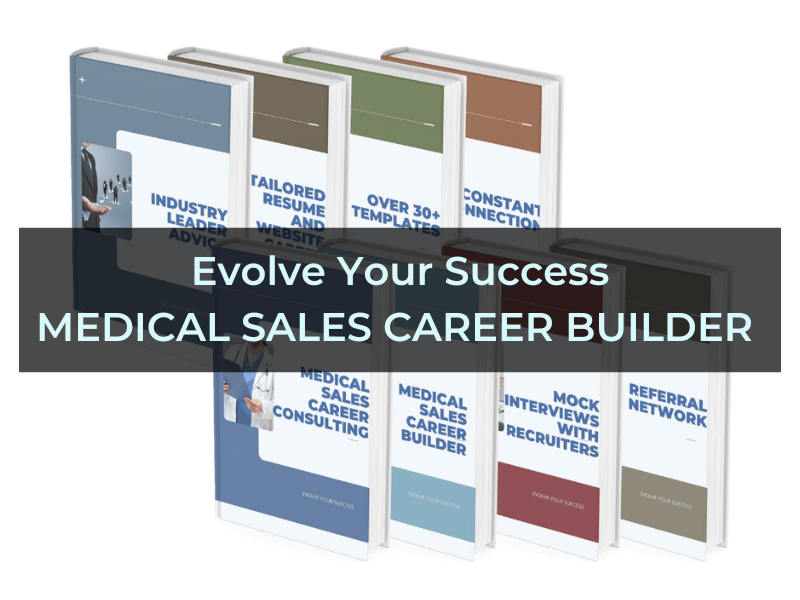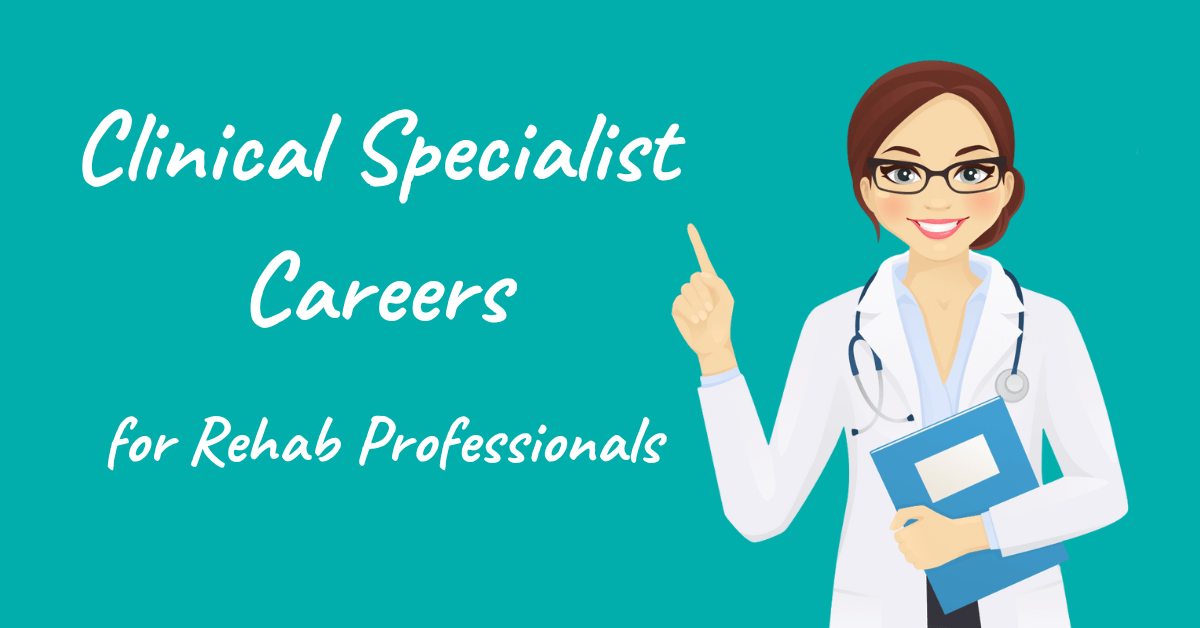This post is written by Krista Berzonsky, PT, DPT, who is a DBS Clinical Specialist for a large medtech company!
A clinical specialist job is a great way for clinicians to break into the medical sales industry. It allows you to use your clinical knowledge while working with cutting-edge technologies that are transforming healthcare.
What type of medical device could a rehab professional specialize in?
- An OT with neuro experience can become an expert in deep brain stimulation for patients with Parkinson’s disease.
- A clinician with an SLP background would be great in the ENT field!
- A PT with wound care experience can champion an innovative wound care device.
- There are even pelvic health neuromodulation devices to help with pelvic floor disorders (overactive bladder, incontinence, urinary retention, etc.)—a very appropriate niche for a pelvic floor therapist!
Quick note: this article speaks to the job title of “Clinical Specialist” in the medical device industry, not the board-certified specialization of rehab clinicians. If you have your OCS, NCS, etc., that may help you land one of these specialized non-clinical roles, but it’s not required!
If you’re looking to combine your clinical background with a new challenge, keep reading to learn how a career in medical device sales could be the next step for you.
Table of contents
- What is a clinical specialist?
- What does a successful clinical specialist look like?
- What does a day in the life of a clinical specialist look like?
- Examples of clinical specialists:
- How much money does a clinical specialist make?
- How to launch a clinical specialist career:
- Additional education needed
- Typical career path for a clinical specialist
- Where can I find clinical specialist jobs?
This post may contain affiliate links or codes. This won’t increase your cost, but it helps keep TNCPT alive, and free of annoying ads! Thank you for your support. 🙂
What is a clinical specialist?
A clinical specialist (CS) delivers expert product support and case coverage within a designated territory, collaborating closely with the sales team. They play a vital role in connecting healthcare providers (HCPs) with medical devices, products, or technologies, offering in-depth product knowledge and comprehensive training. By combining technical expertise with clinical insight, they help optimize the use of medical devices, ultimately enhancing patient outcomes in healthcare environments.
While not directly responsible for sales quotas, the clinical specialist contributes to the overall sales effort and benefits from quarterly commissions as part of the sales team.
It’s important to note that responsibilities may vary depending on the company, division, and product offerings.
Some alternate titles for this job include:
- Field clinical specialist
- Clinical support specialist
- Clinical product specialist
- Clinical sales specialist
- Therapy consultant
Depending on one’s career goals, there may be a selling component in the role. Responsibilities may include attending therapy awareness events, being involved in community support groups (where applicable), discussing product features and benefits with HCPs, and having a competitive understanding of the market share in the territory.
What does a successful clinical specialist look like?
Successful clinical specialists are:
- Organized – In the world of medical device sales, it’s not a typical 9-5 job. You’ll need to keep your calendar organized to ensure you never miss an appointment or a surgical case. Things are always changing, and it’s imperative to stay on top of it!
- Driven – Even though this is not specifically a sales role, there is still an underlying competitive aspect. You will be spending a lot of time with physicians and patients who are using your device, and you are viewed as the expert on your product and will be expected to answer technical questions.
- Self-starter – You’re going to be spending much of your time working solo, as there is no office to work out of. You take the initiative to identify opportunities, set goals, and manage activities independently.
- Outgoing – You’re going to be expected to build relationships with your HCPs, KOLs (key opinion leaders), patients, and teammates. You will be the face they see most, and oftentimes, the relationship between the clinical specialist and the HCP can influence decision making for referrals and use of product.
- Flexible – Your schedule is going to change a lot week to week. You must be able to adapt to these changes and problem solve with your teammates to ensure proper planning. You will also be expected to travel outside of your territory if a teammate is in need of your help.
- Reliable – You’ll need to be reliable, and ensure you are following up on your commitments to your customers and patients. A surgical case cannot happen without you!
- Patient-focused – You always need to put the patient first! This is one of the most important parts of the job. You need to speak up, problem solve, and follow through on your promises to ensure the best patient outcomes. After all, this role wouldn’t exist without the patient.
- Trustworthy – You’ll be put in situations to answer questions about your product, troubleshoot in the OR, and provide solutions. If you don’t know an answer, do NOT make something up! Take a moment, find the answer, call a teammate for support, and get back to the person who asked. Trust goes a long way in roles such as this.
What does a day in the life of a clinical specialist look like?
A slow day:
There will be days where you don’t have activities scheduled, i.e., surgical cases, programming appointments in clinic, conference calls, etc. When you see a day like this on the calendar, you can reach out to your sales rep and/or teammates to see if anyone needs help with case support or clinic. If not, this is a good time to check shelf inventory at hospitals, review emails, return patient phone calls, fill out expense reports, and other administrative tasks. Other responsibilities include reading up on the latest research in your field, news from competitors’ launches, and reviewing your own product literature to fill in any blanks.
A busy day:
You will likely experience different types of busy days in this role. This could mean back-to-back cases in the OR all day, back-to-back patients in a busy programming clinic, or BOTH! You typically know your schedule at least a week in advance and will be able to strategize for days like this. To make your life easier, planning ahead is going to help you the most when you find yourself having one of these days, especially when you need to drive to/from hospitals and clinics. Time management and streamlined communication with your team are key.
A “markety” day:
For those who have aspirations to make the transition into a sales role, a “markety” day could include calling on HCPs to increase referrals and revenue, setting up lunches with an office, etc. This could also mean stopping by a support group or being engaged in the community to educate patients and raise awareness about the device or therapy you’re selling.
Examples of clinical specialists:
We’ve spotlit a few clinical specialists on TNCPT:
- Krista Berzonsky, PT, DPT — DBS Clinical Specialist
- Colleen O’Quinn, OTR/L — DBS Senior Clinical Specialist
- Anna Manor, PT, DPT, NCS — DBS Clinical Specialist
- Jillian Moulton, OTR/L — Field Clinical Specialist
And if education resonates with you, then a career in clinical training (a closely related field) is worth exploring, too!
How much money does a clinical specialist make?
If you are curious about the average clinical specialist salary, here’s what you need to know. CS is typically a salaried role, which oftentimes includes a bonus structure for commission. Since there are often travel requirements, there is an opportunity for monthly vehicle and mileage reimbursement as well. Because of commissions and mileage reimbursement, the average pay is tough to pin down. You can expect anywhere from around 85k-130k per year, depending on years of experience, location, the pay structure, whether you meet quotas and milestones, etc.
How to launch a clinical specialist career:
Going the clinical specialist route is a fantastic way for rehab clinicians (PT/OT/SLP) to break into medical device sales. CS roles do not require a sales background; although, keep in mind, you ARE selling the idea of therapy to your patients every day!
CS positions require a bachelor’s degree with a minimum of two years of clinical experience, or an associate’s degree with four years of clinical experience for entry-level positions, though it’s best to check the job posting from each company, as this can vary.
1. Adapting your resume for a clinical specialist job – This is your opportunity to make your clinical skills shine! Make sure to use key words from the job posting. Also, highlight key experiences you have in relationship building, leadership, and teamwork.
2. Adapting your cover letter for a clinical specialist job – When writing your cover letter, it’s important to highlight your clinical background, relevant experiences, technical skills, and enthusiasm for transitioning into the medical device industry.
3. Interviewing for the role of a clinical specialist – Since this role is focused on the clinical aspect and case support, you’ll need to showcase your clinical expertise related to the division or disease state for the role. For example, if you’re interested in spinal cord stimulation (SCS), you could talk about your relevant experience working with patients with chronic pain. It’s also important to include your “why.” Why are you making the transition to non-clinical work, and why do you want to work for X company?
Sales can feel intimidating! But confidence comes from talking the talk and knowing you’re prepared to walk the walk. It’s much easier to sell yourself in interviews when you’ve gone through formal sales training. We highly recommend upskilling and working with the sales mentors at Evolve Your Success.
Their Medical Sales Career Builder program has a 100% satisfaction rating and 90% placement record! Mention that The Non-Clinical PT sent you to get $800 off!

Additional education needed
None!
Typical career path for a clinical specialist
A clinical specialist role gives you the real-world experience you need to launch a career in medical device sales. That’s just one direction you can go. Keep in mind, you’ll have a variety of career paths to explore once you’ve gained experience as a CS.
For example, if you love the educational aspect of CS, you can focus on clinical training and education. If you have a knack for sales and business development, there’s tons of growth and upward mobility in medical sales. For those who don’t mind a demanding career with lots of travel, medical science liaison can be a challenging but rewarding path.
There is also overlap with lots of other roles in healthtech, so the transferable skills you gain as a CS can open up new opportunities in the non-clinical world.
Even staying within the clinical specialist career path provides lots of options. If you end up at a large medical device company, you can transfer into different departments, such as diabetes, ENT, cranial/spine, navigation, etc.
Where can I find clinical specialist jobs?
Clinical specialists jobs are posted on LinkedIn, Indeed, Glassdoor, company websites, and can be found through networking.
💡 The Non-Clinical PT Insight: Looking for jobs delivered straight to you? Sign up for our free email list here. We send out clinical specialist jobs quite frequently. We’re also constantly updating The Non-Clinical Job Board with new job openings for PT/OT/SLP professionals, available exclusively in Non-Clinical 101.





